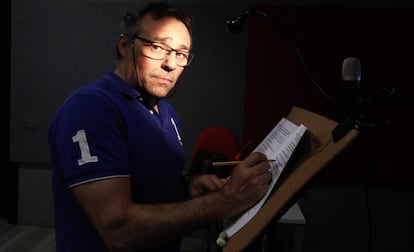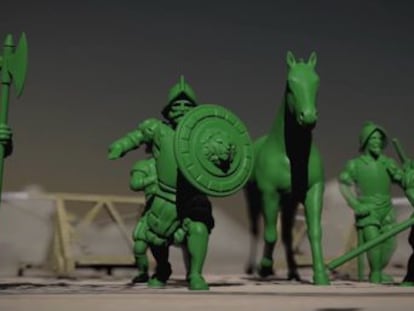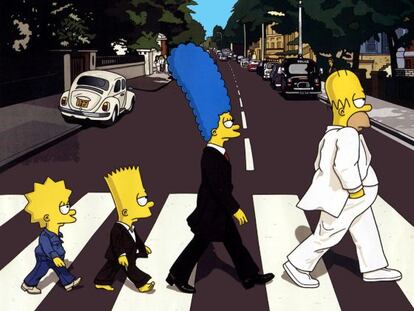‘Sicansíos’: ‘Game of Thrones’ dubbing mistake exposes precarious sector in Spain
Fears over piracy and spoilers have led to strict security measures that make it harder for voice actors to do their job, while the streaming boom has increased job insecurity


Episodes of Game of Thrones never fail to cause a stir on social media in Spain. Whether it’s the poor lighting of one of the most anticipated battle scenes, or the Starbucks cup accidentally left in a shot, the popular HBO series generates thousands of comments online.
After the Spanish version of the third episode went live, all talk was on the dubbing mistake made by one of the voice actors. In the middle of the battle scene, the character Ser Davos yells in English: “She can’t see us!” But in the dubbed version, this is interpreted phonetically as “sicansíos,” even though this word does not exist in Spanish and has never been used before in the series.
?? SHE CAN'T SEE US
— ? Rosenrot ? (@Rozenrot) April 30, 2019
?? SHE CAN'T SEE US
?? SHE CAN'T SEE US
?? SICANS?OS pic.twitter.com/hU0TDj6vY7
The mistake, which led to an onslaught of memes on social media, was a result of the lack of time given to translate the episode. A lot has changed in the dubbing process since 2011, when the first season of Game of Thrones premiered. Spain’s dubbing studios are now terrified about piracy and major plot points leaking, and this fear has led to new rules that make the work of the Spanish voice actors harder.
Episodes of Game of Thrones are screened in Spain a few hours after they are released in the United States, and are subject to incredibly high security measures. Voice actors and other professionals in the dubbing sector say these measures are to blame for devaluing the quality of their work.
“There are colleagues who record from one day to the next, almost completely in the dark, with enormous watermarks on the image, without being able to see the actor’s face and without a complete script to avoid leaks,” says Lorenzo Beteta, a Spanish voice actor who dubbed David Duchovny in the television series The X-Files.
The industry has not been able to reach a national agreement to set higher salaries
Eduardo Bosch, who is the voice of Jon Snow in Game of Thrones, told the Spanish radio station Cadena SER last month that working on the HBO series was awful. According to Bosch, the studio wanted him to work without properly seeing the footage. “It got to the point where they sent us episodes with everything blacked out, except for small circles where the head of our character appeared. Although I understand their point of view, our professional code does not allow us to work like this,” he told the radio station.
Spanish voice actors have managed to get the security controls eased for the final episodes of the hit series.
Greater job insecurity
But it is not just the quality of the dubbing that is being affected; television voice actors are also facing more precarious conditions. Even working on major productions can be counterproductive, says Beteta, who played the legendary Agent Mulder for 175 episodes between 1992 and 2002. “At that time I was working a lot and there were a lot of advertising jobs, because advertisers wanted the voice of Mulder. But when the series ended, no dubbing director wanted the protagonist of their new project to sound just like such a well-known character,” he explains.
Voice actors can make extra money doing commercials, video games and documentaries, when the work from series and films does not pay the bills. But while demand for dramas has grown in the last decade and the arrival of streaming platforms such as Netflix mean there is more work than ever, this does not always translate to more income.
I charged more in the 1990s, than I do now for the same work
Voice actor Lorenzo Beteta
The TV show The X-Files made a comeback in 2016 and again in 2018, years after it was canceled. Beteta returned as Mulder for the two seasons but says that he “charged more in the 1990s, when it was broadcast on [Spanish channel] Telecinco, than I do now for the same work.” It is an example of the great loss in purchasing power the industry has suffered in the past 25 years.
“For recording one episode of a series, a lead voice actor usually makes between €190 and €210 before tax. Now there are more shows to dub, but the series are increasingly shorter and the salaries have not risen,” says voice actor and director Juan Navarro Torrelló. Lead voice actors on Game of Thrones are being paid €1,400 before tax for the final season, while supporting roles take home just a third of that amount.
Torrelló is one of the few in the dubbing profession with a steady income for his work as a dubbing actor and director. Some studios create fixed teams of professions, who are paid to dub “every possible kind of content, regardless of genre or format,” during six-and-a-half-hour work days for €1,700 a month before taxes. The actor admits that this type of flat rate takes away work from the great majority of voice professionals, who are forced to charge per project. Most dubbing studios refuse to say how much they pay their employees.
The failure of recording studios to set work standards is also to blame for the drop in salaries. “Big producers from the United States know that they can take advantage of the situation and invest less in Spain than in other European countries. If one studio does not accept the budget they offer, they threaten to go to another that will lower the cost,” says Beteta.
The curse of VHS
The dubbing industry says that the problems began in the 1980s with the arrival of VHS tapes, and in the 1990s, with regional television stations that required dubbing in other Spanish languages. Suddenly the amount of work increased and this facilitated the creation of new recording studios in other regions apart from Madrid and Barcelona, which dramatically lowered the rates of professionals in the sector.
Internal conflicts between unions, which work under different regional regulations, have also made it impossible for the industry to reach a national agreement to set higher salaries.
English version by Melissa Kitson.
Tu suscripción se está usando en otro dispositivo
?Quieres a?adir otro usuario a tu suscripción?
Si continúas leyendo en este dispositivo, no se podrá leer en el otro.
FlechaTu suscripción se está usando en otro dispositivo y solo puedes acceder a EL PA?S desde un dispositivo a la vez.
Si quieres compartir tu cuenta, cambia tu suscripción a la modalidad Premium, así podrás a?adir otro usuario. Cada uno accederá con su propia cuenta de email, lo que os permitirá personalizar vuestra experiencia en EL PA?S.
?Tienes una suscripción de empresa? Accede aquí para contratar más cuentas.
En el caso de no saber quién está usando tu cuenta, te recomendamos cambiar tu contrase?a aquí.
Si decides continuar compartiendo tu cuenta, este mensaje se mostrará en tu dispositivo y en el de la otra persona que está usando tu cuenta de forma indefinida, afectando a tu experiencia de lectura. Puedes consultar aquí los términos y condiciones de la suscripción digital.










































